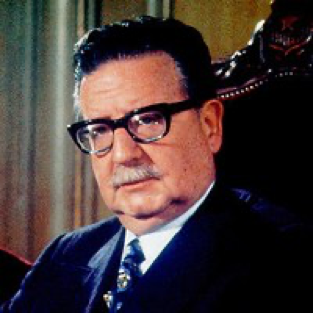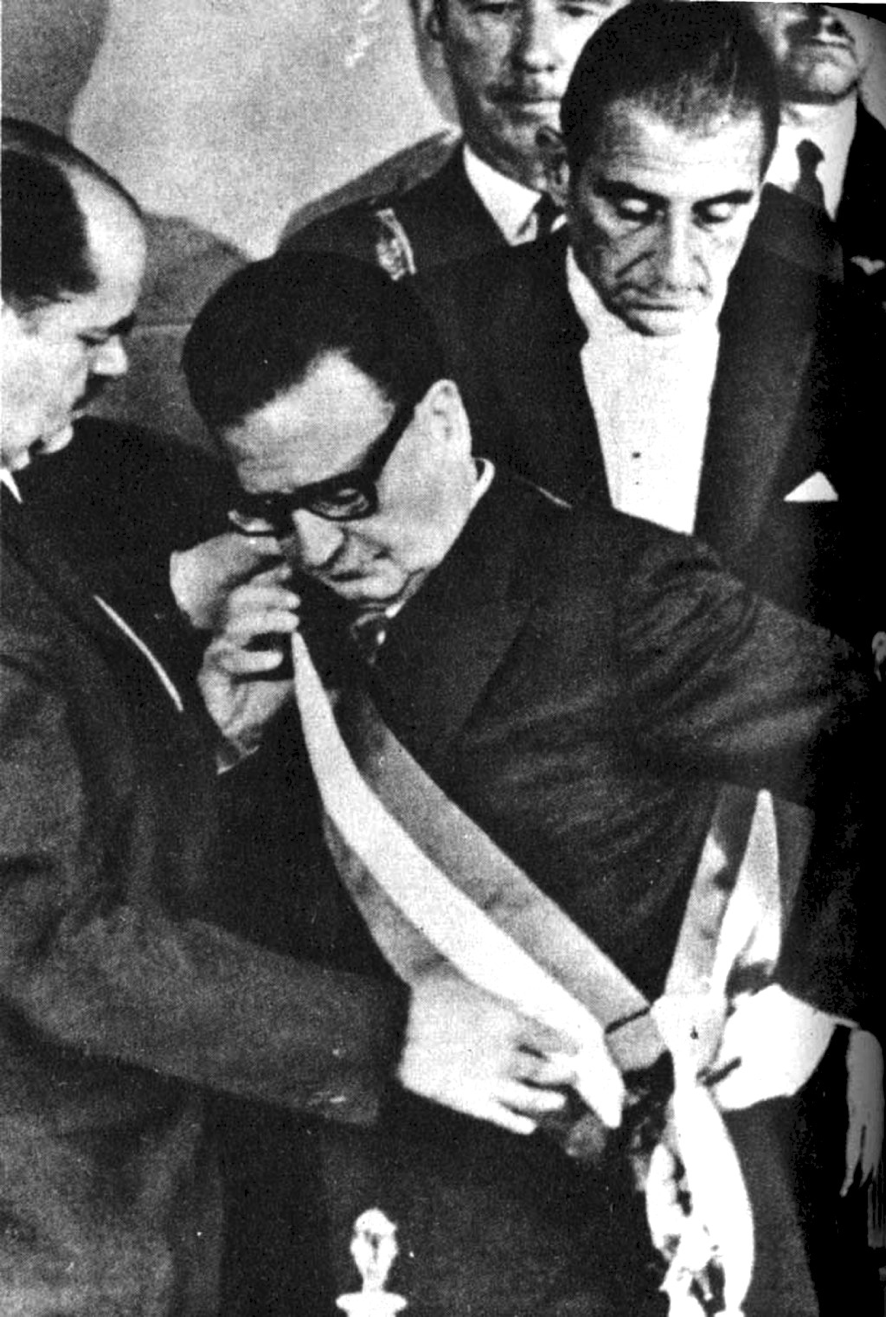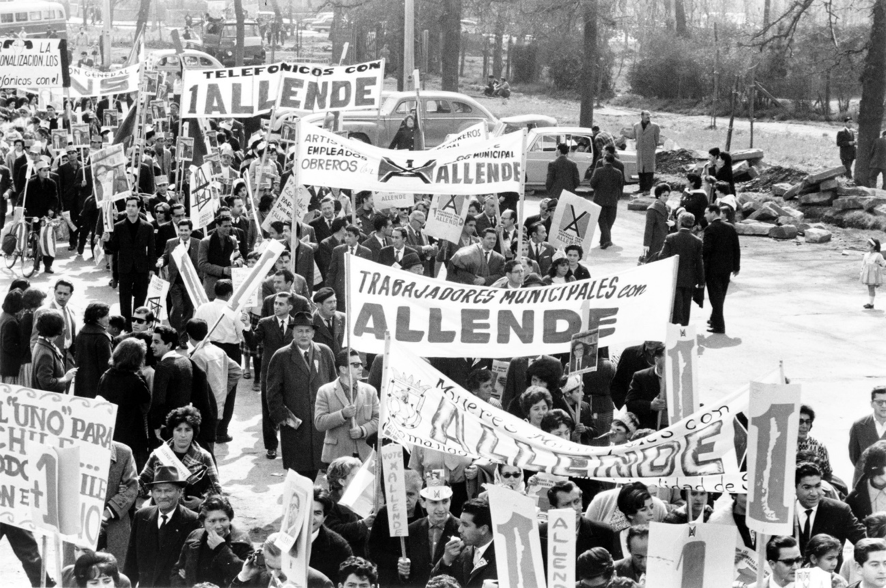VALPARAÍSO, 1908 – SANTIAGO (CHILE), 1973
Por Rodrigo Nobile
 Salvador Allende Gossens came into contact with socialist thought from his early youth when he was active in student politics. After completing his military service, he studied medicine at the University of Chile (UC). There, he participated in the leftist movement Avance, from which he was expelled for supporting practices deemed democratic. In 1933, he founded the Socialist Party with other companions, in which he would remain active for his entire life. Four years later, he participated in the parliamentary campaign and supported the presidential campaign of Pedro Aguirre Cerda. After the double victory, he was appointed Minister of Health and chose to resign from his position in the Legislative Power of Valparaíso. He wrote the book The Chilean Medical-Social Reality and in 1941 traveled to Peru, where he met with militants of the American Popular Revolutionary Alliance (APRA). The following year, he took on the Secretaryship of the Socialist Party.
Salvador Allende Gossens came into contact with socialist thought from his early youth when he was active in student politics. After completing his military service, he studied medicine at the University of Chile (UC). There, he participated in the leftist movement Avance, from which he was expelled for supporting practices deemed democratic. In 1933, he founded the Socialist Party with other companions, in which he would remain active for his entire life. Four years later, he participated in the parliamentary campaign and supported the presidential campaign of Pedro Aguirre Cerda. After the double victory, he was appointed Minister of Health and chose to resign from his position in the Legislative Power of Valparaíso. He wrote the book The Chilean Medical-Social Reality and in 1941 traveled to Peru, where he met with militants of the American Popular Revolutionary Alliance (APRA). The following year, he took on the Secretaryship of the Socialist Party.
After his experience in the Executive Power, he was elected as a member of the Senate in 1945, 1953, 1961, and 1969 for different regions. His performance in the Legislative Power was characterized by the defense of moderate socialism and national sovereignty, as well as the fight against inequality, imperialism, and oligopolies. Another stance that accompanied him throughout his life was his internationalism, evidenced by his trips to the Soviet Union and other countries in the socialist bloc. In 1959, he traveled to Cuba, where he acknowledged the merits of the Cuban Revolution and subsequently denounced the U.S. blockade. He had a friendship with Fidel Castro and dialogue with Ernesto Che Guevara. He went to welcome the surviving guerrillas from Che’s group at the border with Bolivia to ensure their physical integrity, and in 1968, he led the Chilean delegation at the meeting of the Latin American Solidarity Organization (OLAS).
Adversaries
As Allende’s political career rose steadily, his enemies grew stronger. The most visible of his adversaries was the conservative press, led by the newspaper El Mercurio, which, according to an interview with the socialist leader, represented banks and monopolies. Allende had an intense confrontation with Agustín Edwards, owner of Banco Edwards and the major shareholder of that newspaper. Sectors linked to foreign capital were also aware that he defended positions contrary to their interests.
 Allende was defeated three times before being elected president. The first in 1952, against General Carlos Ibáñez, at which time the communists allied with socialist factions. The second, in 1958, after the reunification of the socialist parties—an event that strengthened alliances with the Communist Party and other movements like the Independent Popular Action (API) within the framework of the Popular Action Front (FRAP). Allende came in second place, with only 35,000 votes less than Jorge Alessandri Rodríguez. The third time, in 1964, Allende was defeated as the candidate of the FRAP against Eduardo Frei Montalva, who proposed a reformist-conservative project supported by the United States and partially financed by the CIA.
Allende was defeated three times before being elected president. The first in 1952, against General Carlos Ibáñez, at which time the communists allied with socialist factions. The second, in 1958, after the reunification of the socialist parties—an event that strengthened alliances with the Communist Party and other movements like the Independent Popular Action (API) within the framework of the Popular Action Front (FRAP). Allende came in second place, with only 35,000 votes less than Jorge Alessandri Rodríguez. The third time, in 1964, Allende was defeated as the candidate of the FRAP against Eduardo Frei Montalva, who proposed a reformist-conservative project supported by the United States and partially financed by the CIA.
In 1970, Allende ran again as a presidential candidate for the Popular Unity coalition. Among the factors that favored him at this time were the support of the popular classes, the growing radicalization of the countryside and marginalized urban sectors, and the economic crisis that wore down the Christian Democratic government of Frei. Negative factors included the backlash against U.S. foreign policy—which intensified its intolerance for leftist governments in the region and led to orchestrating coups through the CIA—the strength of the Brazilian military dictatorship, Allende’s fatigue among his peers for having lost three presidential elections, his faith in the peaceful path of socialism—which was not a consensual position—the polarization of Chilean society, and attacks from the conservative press.
The Last Three Years
Amidst this turbulent scenario, Allende won the elections on September 4, 1970, by a narrow margin, which made clear the future difficulties he would face in governing. He nationalized copper and strengthened state planning of the economy but had trouble extending nationalization to other companies, as his government program foresaw, due to opposition from Congress and the Judiciary. After a year in power, his government faced intense boycotts—from both companies and Congress—and attacks from the press and acts of terrorism from the far-right group Patria y Libertad.
Seeing conditions worsen, Allende sought to ally with those political sectors in the center and the Army whom he considered legalists, forming a civic-military cabinet. This action provoked harsh criticism from the left, primarily from the Revolutionary Left Movement (MIR) and the left of the Socialist Party. However, the turning point was the attempted coup on June 29, 1973, which, although it did not achieve its goal, revealed the fragility of the Chilean left.
In light of the intensification of protests, Allende consulted the military Augusto Pinochet—who was part of the cabinet—about calling a plebiscite to be held on September 11, 1973, to ensure the democratic transition of government. The Armed Forces acted ahead of time and orchestrated a coup d’état for that same day.
On the day of the coup, Allende slept at home and then went to La Moneda Palace already forewarned, as he had been informed that the Palace was surrounded by tanks. He spoke by radio to the country that same morning, calling for resistance, but this time the coup had much more strength than the previous attempt. He received numerous phone calls of support, including one from MIR leader Miguel Enríquez Espinosa, who offered a rescue plan. However, the president was determined to resist until the end in the Palace. He also rejected the proposal from some officers who offered him a plane to leave the country with his family. He fought fiercely against the troops surrounding the Palace, wearing a miner’s helmet and armed with a Soviet AK-47 rifle, a gift from Fidel Castro. In his last speech, delivered from La Moneda Palace on September 11, 1973, and broadcast by the radio of the Central Workers’ Union, Allende bid farewell to his people reaffirming his certainty of a more just Chilean society:
“Workers of my homeland, I have faith in Chile and in its destiny. Other men will overcome this gray and bitter moment, in which treason seeks to impose itself. Know that, much sooner than later, the great avenues will open where free men will pass to build a better society.”
Allende remains an icon of the Chilean left, alongside Luis Emilio Recabarren, Pablo Neruda, Gladys Marín, and Miguel Enríquez, among many others.
Traduzido pelo ChatGPT.



